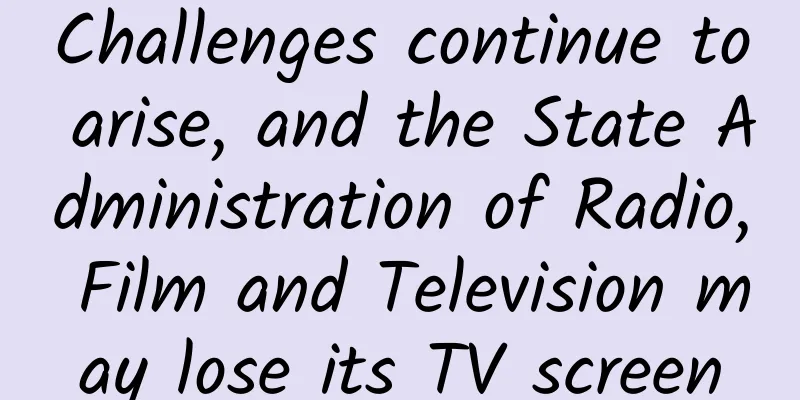Challenges continue to arise, and the State Administration of Radio, Film and Television may lose its TV screen

|
1. Traditional TV channels and TV stations are strongly impacted by new media. Cable TV operators around the world are declining. Online video, mobile video, and OTT are diverting viewers from TV stations and cable networks. Domestic video new media users have exceeded 430 million and are in a stage of sustained rapid growth. Cable TV users began to leave. In 2013, TV stations’ advertising revenue was 130.2 billion, and the growth was stagnant. In 2014, advertising revenue began to decline (the data was not made public). 2014 was the first year of the TV stations’ decline, and it will continue to go downhill. 2. TV has lost the PC screen and mobile screen. First, it has lost the PC screen. Commercial video websites have completely defeated the new video media of radio and television institutions and occupied the vast majority of PC screen users. Second, it has lost the mobile screen. With the popularization of mobile smart terminals such as mobile phones and PADs, commercial video websites have quickly occupied mobile videos, and the mobile TV license of the State Administration of Radio, Film and Television has basically expired. 3. The General Administration is losing the TV screen. First, the terminal management is ineffective. The intelligentization of TV terminals (including all-in-one machines, boxes, etc.) is becoming popular and increasing in scale (it is expected that the stock of smart terminals will exceed 200 million in 2016), and the activation rate and active rate are constantly increasing (active users will exceed 100 million in 2016). The openness of smart terminals and the Internet has led to terminal manufacturers guiding users to flash their devices and install commercial video website APPs. In general, users of smart TV terminals will be able to watch Internet videos at will in the future. The General Administration's terminal ID control system has not been able to control the terminals, and most terminals are outside of policy control. Second, the market access system is not implemented. The General Administration has implemented the OTT license system for market access, but commercial video websites and terminal manufacturers have begun to enter OTT. Currently, 80% of existing smart TV terminal users have no access to OTT broadcast control. There are also a large number of users who have flashed their devices and installed commercial video website apps on the broadcast control platform. Currently, most of OTT's viewership and traffic come from commercial video websites. In June 2014, the State Administration of Radio, Film and Television began to strictly regulate, standardize the behavior of licensees, clear out non-compliant market entities, and rectify smart terminals such as OTT boxes. This has curbed the rapid and disorderly development of Internet TV to a certain extent. However, in the long run, in terms of technology and business development trends, Internet TV is irreversible, and Internet TV will still maintain a considerable growth rate in the next few years; blocking regulatory methods can slow down the pace of development, but cannot change the development trend. 4. The General Administration's regulatory logic has changed. In February this year, the General Administration issued a document to regulate the self-made dramas and UGC content of commercial video websites, requiring PGC content production to have a production license and UGC content to be real-name. All broadcasts on the Internet are subject to review before broadcast. Starting in April, the Internet Cleaning Action reduced the number of American dramas and self-made dramas. It is said that imported dramas will also be subject to review before broadcast. Tian Jin has repeatedly emphasized that Internet TV should be regulated in accordance with the management standards of radio and television. 5. The market access system for OTT licenses and IPTV licenses is gradually weakening. The General Administration has begun to strengthen content supervision when it is unable to effectively supervise smart terminals and the market access system cannot be implemented. It is very likely that the General Administration will use content supervision as the most important means of supervision, and channel supervision and terminal supervision will continue to weaken under the impact of the market. This means that the OTT market will be gradually liberalized, and OTT licensees in the radio and television system will face direct competition with video websites. They are not rivals of video websites in terms of system, capital, technology, and experience, and licensees will face the risk of being squeezed out of the market. After adopting strict content review and supervision policies, the General Administration will control the source of content, and the video content will meet the central government's propaganda requirements, thus completing its political mission. The market access system for OTT licenses and IPTV licenses is no longer important, and the General Administration is very likely to gradually abandon the license supervision system, similar to the current mobile TV license. Without policy support, it will be difficult for fully market-oriented licensees to win in the fierce market competition. 6. Will the SARFT run new TV media? In the traditional radio and television era, the SARFT successfully built and operated central-level radio and television media, including CCTV, CRI, CNR, etc. "Managing radio and television, and operating radio and television" have been very successful. In the coming Internet era, traditional radio and television are declining, and video new media are gradually becoming mainstream media. The General Administration has implemented a strict control system for video new media, but technology, market and trends have gradually broken through the restrictions of policies, and the General Administration's regulatory policies have been constantly adjusted. We are beginning to shift from "managing the subject, content, channels, and terminals" to "mainly content supervision, supplemented by other aspects". The problem of "management" has been solved, but what about the problem of "operation"? At present, the new media development and commercial video websites of the three major radio and television institutions directly under the General Administration are not heavyweights. The General Administration has issued documents many times requiring TV stations to vigorously develop online TV stations. Under the constraints of system, funds, technology and other aspects, the new media of the national radio and television system is still very weak. In 2009, Li Changchun personally clicked on CNTV to go online, showing the central government's determination to run new media. Although CNTV is the best among state-owned media, it is still far behind commercial video websites. The growth of Sina Weibo and WeChat has made the central government realize that market-oriented new media can be controlled and utilized. Whether to invest huge sums of money to run an online TV station and whether it can succeed is a question worth discussing. The problem the General Administration is facing now is that, according to the central government's requirements, television content must be produced. Does it need to run new media like the three major TV stations? Or should it just be positioned as a government department to regulate the industry? As a winner of Toutiao's Qingyun Plan and Baijiahao's Bai+ Plan, the 2019 Baidu Digital Author of the Year, the Baijiahao's Most Popular Author in the Technology Field, the 2019 Sogou Technology and Culture Author, and the 2021 Baijiahao Quarterly Influential Creator, he has won many awards, including the 2013 Sohu Best Industry Media Person, the 2015 China New Media Entrepreneurship Competition Beijing Third Place, the 2015 Guangmang Experience Award, the 2015 China New Media Entrepreneurship Competition Finals Third Place, and the 2018 Baidu Dynamic Annual Powerful Celebrity. |
<<: Behind WeChat’s crazy “ban”: the pain of WeChat Pay
>>: One year after Huang Zhang’s comeback: Meizu’s de-familyization revolution
Recommend
Why do athletes practice skiing on "Enoki mushrooms"?
The Beijing Winter Olympics is about to open. The...
Dual-mode connection, 4-level DPI adjustment, Xiaomi convenient mouse 2 makes mobile office more convenient
Mobile office has become a modern trend of workin...
A new cold front arrives tonight! Where will there be a blizzard? | Expert interpretation
The Central Meteorological Observatory predicts N...
The mystery of the famous supernova explosion: Astronomers finally see the true face of the mysterious celestial body 170,000 light-years away
The evolution and fate of stars are closely relat...
[Creative Incubation Program] Is the plot of "Jurassic World" realistic? Can we resurrect dinosaurs?
Author: Liu Sen Recently, Jurassic World 3 was re...
The number of epidemic risk areas continues to increase! Here's how to find the nearest "epidemic community"
As of 0:00 on January 3, 2021, the number of medi...
Lesson 7 of CTO Training Camp: Pitfalls in Performance Management and R&D Management of Technical Teams
[51CTO.com original article] When a technical tea...
Nine blogs worth following for hybrid mobile app developers - Mobile Development Technology Weekly
...
Apple to try adding mental health features to iPhone
Apple is working on a series of new programs to h...
Can you send iMessages on your Android phone? How does weMessage work?
iPhone to Android: But what about iMessage? Nowad...
Can Mobike’s credit score really control the random parking of shared bicycles?
Some time ago, shared bicycles were regulated in ...
"The Hunchback of Notre Dame", a tragedy caused by square dancing?
Hunzhi helps you read the famous book "Hamle...
What you don’t know about the THAAD system is more harmful than a chip!
Preface: The THAAD system has changed the sunny sk...
Everyone is cheering for NIO, but will you pay for it?
Just yesterday, NIO released its first mass-produc...









